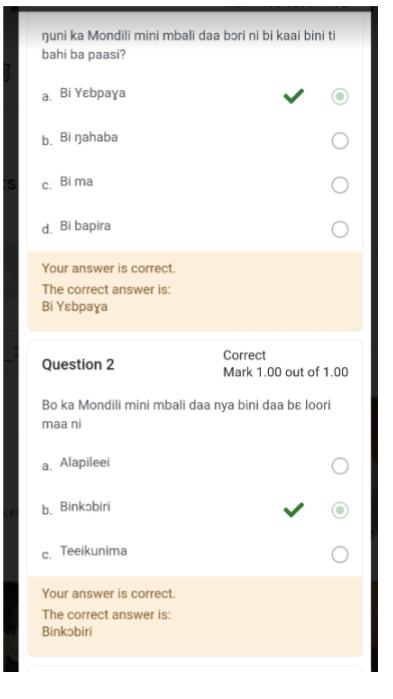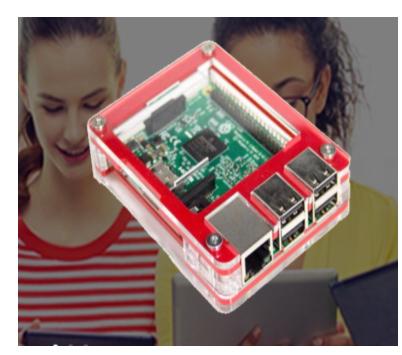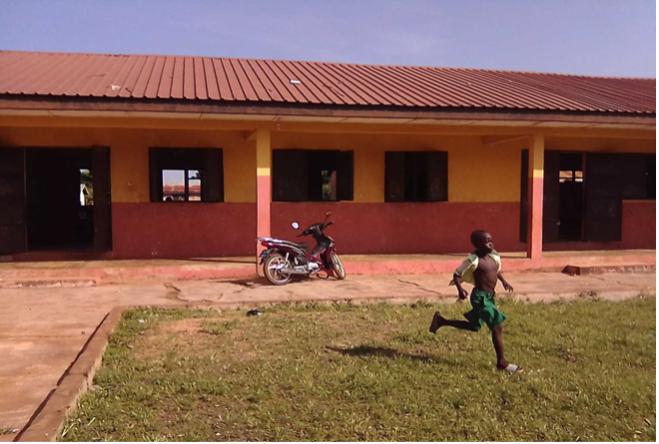The OERtist Tool

This reading comprehension quiz of a book in Dagbani, the student’s mother tongue, was created by team member Peter Amoabil. There is no internet access in the school. Students read the book and take the quiz via MoodleBox and their WIFI devices.
The OERtist Tool (a tool for the artful use of OER, Open Educational Resources) provides enhancements to the world’s most widely used learning management system so that
- learning is accelerated;
- assessment is improved;
- the needs of special learner populations are addressed;
- student motivation, wellbeing, engagement, and persistence is fostered;
- and teachers and educational leaders are supported.
The specific learners initially addressed by the OERtist Tool are African Elementary students in rural areas where the internet is only available intermittently or not at all. The tool incorporates AI-enabled translations of OER math and reading content into the many first languages of Africa, enables teachers to quickly analyze where students are in their learning journey, and recommends appropriate assessments of both reading and math content. The tool also enables the analyses to be aggregated in a global database from which suggestions are offered to teachers for the next step or phase of the student’s learning.
Extreme barriers to learning currently exist for a significant percentage of elementary students in Africa. Most elementary students in rural Africa do not have access to essential reading and math materials in any format, especially in a digital format. The OERtist Tool focuses on these most disadvantaged learners and then scales to learners in environments with modern technology resources.
The new features provided by the OERtist Tool are:
1. the ability to use AI for translations of OER reading and math content and creating the associated assessments.
Here’s an example – of a book translated from English to isiXhosa using AI and edited by Nomvuyo Mgoqi, one of our team members.
2. The ability to do this in remote locations without internet and intermittent power as well as urban centers with all available modern technologies.
3. The ability to collect the learning data from either remote locations or technology-enabled urban locations and analyze any or all data to provide applicable enhancements to instruction;
4. Learning collaboratives can be created in either small groups or very large groups because all of the content and management software is openly licensed/open source.
An essential feature of the OERtist Tool is that it is assumed that teacher professional development and training will be included and necessary for implementation. This is especially true for the initial targeted population of remote locations where previous experience with digital tools is limited or does not exist. It is not a ‘plug and play’ tool. Teaching is a difficult and very complicated activity. The OERtist Tool provides significant benefits, but support and collaboration will be necessary. Teacher support and collaboration is a desirable feature, not something to be avoided.

This book, Picture Story Telling – Kanvilli Nuriya 2 was created from an assignment given to the students at the school by their teacher, Mr. Peter. Until January of 2023, none of the students had ever held a tablet, cell phone, or computer in their hands. None of their parents have phones or TVs. Internet is not available at the school. Students took the pictures with their WIFI devices and added captions using MoodleBox in their classroom.

The girls in the video below are in a school in the Northern Region of Ghana. They are reading a book on their WIFI devices in Dagbani, their mother tongue. The book was downloaded from African Storybook and then uploaded to the MoodleBox in their classroom by their teacher, Peter Amoabil. There is no internet access available in this school. Print books in Dagbani are very rare, so the digital books make literacy in their mother tongue much more easily available.
The OERtist Tool works in conjunction with MoodleBox, an open-source version of the Moodle learning management system software. MoodleBox operates on a small Raspberry Pi server that can provide access to content and assessments in areas without internet and poor electrical power. The engineered learning capabilities of the OERtist Tool will be most practically available to teachers or educational administrators when their MoodleBoxes are periodically connected to the internet. When connected to the internet both content and Learner data can be transmitted to a central location and then transmitted back to the remote location when suggestions and updates have been made by the engineered learning portion of the Tool.
The anonymized student information will be collected and analyzed in the central location. The central collection can be scaled from a single classroom to a national or global collection of similar systems.
Our Team
Our team is an international group of professionals with extensive careers in teaching and learning who have previously worked together successfully:
Dan McGuire, (US) – Executive Director of SABIER, OER support for teachers; Team Lead
Nicolas Martignoni (Switzerland) – Founder of MoodleBox;
Steve Miley – (US) – Project Manager / Software and IT Architect;
Gerald Henzinger (Austria) Co-founder and Managing Partner think modular Gmbh
Marcus Green – (UK), Moodle developer; Learning design
Sanja Cancar (Austria) – Social innovation, cooperation, and tool design.
Kathryn Kure, (South Africa) CEO of STEAM Fnd NPC; research and teacher professional development
Jon Fila – (US) AI leveraging teacher/consultant; teacher professional development, Moodle course design
Peter Amoabil – (Ghana) Founder of Rural Literacy Solutions; teacher professional development
Nomvuyo Mgoqi – (South Africa.) Founder of Khulisani Child Development Academy; Research and teacher professional development
Paul Spiesberger (Austria) TU Wien – Chair ICT4D.at. Research, software development, and project management
Stephane Coillet-Matillon (Switzerland) CEO and co-founder Kiwix
Here’s the review of our pilot project.
The OERtist Tool is currently in development. If you’d like to join or support our work, contact dan@sabier.org